|
|
|
Sort Order |
|
|
|
Items / Page
|
|
|
|
|
|
|
| Srl | Item |
| 1 |
ID:
155750


|
|
|
|
|
| Summary/Abstract |
Analysis of Sri Lanka’s foreign policy over three decades (1977–2015) reveals a pattern of shifts from balancing to bandwagoning, and then back again to balancing. The more salient foreign policy issues during each administration fall broadly within the economic or security spheres. What are the key drivers of small state foreign policy – do systemic factors preside in general, and domestic factors prove inconsequential? Or are domestic factors able to play a decisive role under certain circumstances, within broader structural parameters? Three primary arguments are made in this regard. First, an interplay of system- and domestic-level factors best explains this pattern of foreign policy change. Second, in the domain of foreign economic policymaking, domestic imperatives and actors appear to play a decisive role, although within the broader structural preconditions. Third, systemic factors maintain predominance over domestic-level factors in shaping foreign security policy.
|
|
|
|
|
|
|
|
|
|
|
|
|
|
|
|
| 2 |
ID:
155751
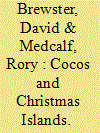

|
|
|
|
|
| Summary/Abstract |
Australia’s Cocos Islands and Christmas Island are remote islands with potentially great significance for Australia’s strategic role in the eastern Indian Ocean region and the wider Indo-Pacific. This paper explores the growing militarization of islands throughout the Indian Ocean in the context of growing strategic competition in the region. It then considers the strategic value of Australia’s Indian Ocean territories and makes recommendations about the further development of defense infrastructure to potentially support Australian air operations in Southeast Asia and the eastern Indian Ocean. Upgraded facilities on both Cocos and Christmas would provide Australia with valuable leverage in its relationships with regional defense partners and the United States.
|
|
|
|
|
|
|
|
|
|
|
|
|
|
|
|
| 3 |
ID:
155753
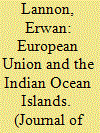

|
|
|
|
|
| Summary/Abstract |
The aim of this paper is to analyze, from a geostrategic, geo-economical and cooperation perspective, the relationships established by the European Union with the Indian Ocean Islands: Comoros, Madagascar, Maldives, Mauritius, Seychelles and Sri Lanka. The analysis also takes into consideration the cases of Mayotte, La Réunion, the Scattered Islands and the Chagos Archipelago. At strategic level, the EU has developed its actions in the Indian Ocean since the launching of the naval operation EU NAVFOR-ATALANTA in 2008, in response to the rising levels of piracy in the region. At geo-economic level, the implementation of the interim Economic Partnership Agreement with Madagascar, Mauritius, the Seychelles, and Zimbabwe is a major step, but other (potential) trade agreements, notably with Indonesia and India, have to be taken into consideration. At cooperation level, different EU’s (sub-)regional and bilateral actions are analyzed, including new specific programs and projects combining external and internal financial instruments in the region. The analysis of this complex network of relationships is the basis for identifying opportunities for developing a more ambitious and comprehensive strategy of the European Union vis-à-vis the Indian Ocean islands.
|
|
|
|
|
|
|
|
|
|
|
|
|
|
|
|
| 4 |
ID:
155752
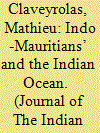

|
|
|
|
|
| Summary/Abstract |
Starting from a broad historical overview, and focusing on the main group in the Mauritian population (the Hindu descendants of indentured laborers), this paper goes through the many and changing narratives of indenture, as a ‘domesticating paradigm’ promoted in both literature and identity discourses. It deals with three connected questions, each helping us understand the relations between Mauritius and the Indian Ocean. First, is the issue of the links between so-called Indo-Mauritians and India, the territories their ancestors came from: have they been severed or enhanced? Second, comes the auto-representations and status of Mauritius: is it an ideal center-of-the-world, or a relegated island lost in the Indian Ocean? Third are the representations Indo-Mauritians have of their original migrations, through the crossing of the Indian Ocean. A final point notes the poor inclusion of Mauritius in the Indian Ocean compared with the powerful and exclusive link between India and Mauritius.
|
|
|
|
|
|
|
|
|
|
|
|
|
|
|
|
| 5 |
ID:
155755
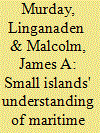

|
|
|
|
|
| Summary/Abstract |
The inclusion of a Sustainable Development Goal (No. 14) on the oceans by the United Nations (UN) provides formal and global recognition that the effective management of the blue economy is a key component of global development efforts. For island states, the importance of the maritime domain is unquestionable with many having responsibility for, and access to, vast areas of ocean. In the Indian Ocean region, island states have increasingly recognized this situation by placing greater emphasis on ocean policy and the opportunities the maritime domain offers. However, island states inevitably face challenges as their smaller size often means they lack the capacity to enhance their maritime domain awareness and effectively respond to insecurity. This paper seeks to shed further light on the maritime security considerations – their characteristics and influencing factors – of island states in the Indian Ocean. The paper contains a content analysis of key documents to examine the way in which maritime security challenges have been publicly communicated by island states in the region. It then utilizes additional documents and interview material to elaborate the way in which two specific states – Mauritius and Seychelles – have approached their maritime security in maritime piracy for Seychelles and drug trafficking in Mauritius. In doing this, the paper provides valuable insights into the way in which policy-makers in Indian Ocean island states understand the sustainable development–maritime security relationship.
|
|
|
|
|
|
|
|
|
|
|
|
|
|
|
|
| 6 |
ID:
155754
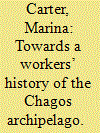

|
|
|
|
|
| Summary/Abstract |
The article presents a critical investigation of the historiography of the Chagos archipelago and in particular the expelled islanders, known as Ilois, and more recently as Chagossians. A brief survey of the discovery and settlement of the atolls is provided, along with a more detailed summary of key events in the history of workers on the archipelago from the late-eighteenth to mid-twentieth century. Finally, the paper discusses the challenges of framing a workers’ history characterized by exploitation and marginalization alongside the romanticized collective representation of life in the archipelago which has been adopted as a ‘narrative of exile’ by the Chagossians.
|
|
|
|
|
|
|
|
|
|
|
|
|
|
|
|
| 7 |
ID:
155756


|
|
|
|
|
| Summary/Abstract |
Disasters caused by cyclones are a cyclical event in the Bay of Bengal delta seaboard. Periodically, cyclone disasters result in damaged houses and the loss of crops and livelihoods. They affect every type of social and economic infrastructure in the delta, which is inhabited by ostracized backward caste groups – seafarers, forest goers and landless peasants. The 1970 Bhola cyclone, for example, was the most catastrophic, generating a 9.1-meter storm surge at the mouth of the Ganges where it meets the Bay killing approximately 300,000 people. Often, these disasters are declared as ‘natural’ and ‘acts of God.’ This paper tests this epistemic viewpoint. I argue that cyclone-related disasters, like other calamities, cannot be merely viewed as ‘natural’ phenomena. Instead their embeddedness in the social and political relations shaping human habitation on the coastal seaboard endangers human settlement and has made the inhabitants vulnerable since the colonial land reclamation program began in the late eighteenth and early nineteenth century in Bengal. Through examination of competing discourses around ‘natural disasters’, I demonstrate how cyclones are portrayed as natural (rather than human-induced). The naturalization of disaster benefits powerful actors like politicians, civil engineers and contactors, among others. In analyzing the disaster narrative, I go beyond the textual and rhetorical components to include the socio-political and historical bases of the production of ideas of disaster in the Bengal delta. By focusing on the political and social causes of disaster, this paper does not in any way question the ontological reality of cyclones ‘as dangerous and potentially very destructive natural hazards’; instead, it tries to demonstrate how disaster is naturalized in the different strands of state and epistemic discourse.
|
|
|
|
|
|
|
|
|
|
|
|
|
|
|
|
|
|
|
|
|